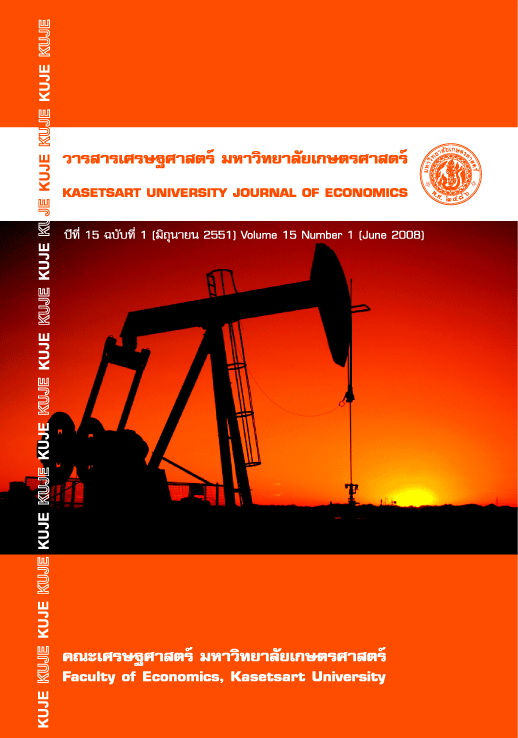การวิเคราะห์ทางเศรษฐศาสตร์ของการประเมินวงจรชีวิตเอทานอล
Main Article Content
Abstract
บทคัดย่อ
การศึกษานี้ประเมินความคุ้มค่าทางเศรษฐศาสตร์ของการผลิตและการใช้เอทานอลจากมันสำปะหลังและอ้อยเป็นวัสดุเชื้อเพลิงทดแทนสารนำเข้า methyl tert-butyl ether (MTBE) การวิเคราะห์พิจารณาตลอดวงจรชีวิตของแก๊สโซฮอล์ 95 (เบนซินผสมเอทานอลร้อยละ 10 หรือ E10) เปรียบเทียบกับเบนซิน 95 (ใช้ MTBE เป็นสารเพิ่มค่าออกเทน) ผลการวิเคราะห์โดยภาพรวมพบว่าการใช้เอทานอลทดแทน MTBE มีความคุ้มค่าทางเศรษฐศาสตร์ เนื่องจากเกิดการประหยัดในรูปของการทดแทนการนำเข้า MTBE เป็นสำคัญ ซึ่งสะท้อนถึงผลประโยชน์ที่เกิดขึ้นหากจะมีการใช้พืชพลังงานในประเทศมาผลิตเป็นเอทานอล สำหรับการวิเคราะห์ผลประโยน์ด้านสิ่งแวดล้อมพบว่ายังมีมูลค่าในสัดส่วนน้อย
คำสำคัญ : การประเมินวงจรชีวิต, เอทานอล, เอ็มทีบีอี, มันสำปะหลัง, อ้อย
Abstract
This study evaluates economic feasibilities of the production and use of ethanoi fromcassava and sugarcane. Ethanoi is a substitute for methyl tert-butyi ether (MTBE). A comparativeevaluation between an ethanol-blend fuel-gasohol 95 (E10) and a MTBE-blend fuel (benzene 95)is based on the life cycle assessment approach. The use of ethanoi as a substitute for MTBE wasfound to be economically feasible. This is mainly due to MTBE import substitution, reflecting thebenefits generated from using domestic fuel crops for ethanoi production. Meanwhile theenvironmental benefit was in a small proportion.
Keywords : life cycle assessment, ethanoi, methyl tert-butyi ether (MTBE), cassava, sugarcane
Article Details
The paper is published under CC BY-NC-ND, in which the article is freely downloaded and shared in its original form non-commercially and its citation details are identified.


